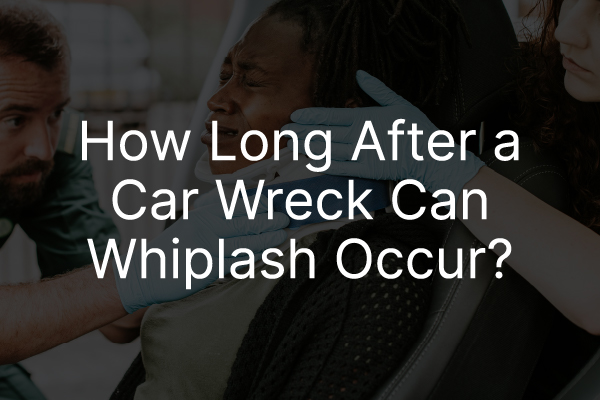
Understanding Whiplash After a Car Wreck
It happened so fast that all you remember is slamming on the brakes. The back of your car looks like a scrunched-up accordion, and the vehicle that hit you doesn’t look any better. Besides being shaken up, you don’t feel any injuries. You can walk, all your limbs move as they should, and you’re not in pain. You give your report to the police, exchange information, and go about your merry way.
The next day, your neck stiffens, and the pain is unbearable. You go to the doctor’s office, and the doctor tells you that you are suffering from whiplash, which was likely caused by your accident.
A few questions pop into your mind: What is whiplash? How long after a car accident can whiplash occur? Can I still claim compensation for the injury even if I didn’t report it at the time of the accident?
The personal injury attorneys at the Hernandez Law Group, P.C. understand the concerns surrounding an accident when the injuries don’t show up right away. In this article, we give an extensive overview of what whiplash is and whether or not you can still claim compensation if the injury wasn’t apparent immediately after your accident.
What Is Whiplash and How Does It Happen?
Whiplash is a neck injury that is caused by a forceful, sudden back-and-forth motion of the neck (like a whip). This movement hyper-extends the soft tissues, muscles, and ligaments in your neck.
In a car accident, your body lunges forward and is suddenly stopped by the seat belt, airbag, or both. While your body may have stopped moving, your head and neck continue forward and then snap backward.
Are Car Accidents the Only Way Whiplash Can Occur?
No. Whiplash is also common in contact sports, falling from a horse or bicycle, or any other violent fall. Whiplash can even occur in a physical altercation.
How Long After an Accident Does It Take for the Symptoms of Whiplash to Appear?

Depending on how severe the accident was and the circumstances surrounding the injury, most individuals notice symptoms immediately or within 24 hours. It is not uncommon for individuals who have suffered whiplash to not experience any pain or symptoms right away, as the adrenaline from the crash can mask the pain. Even if you go to the doctor, they may not be able to make a diagnosis because there is no pain.
It is important to know, though, that when symptoms do arise, you will want to go back to the doctor to get a proper diagnosis. Never try to diagnose yourself with whiplash—this will prevent you from getting medical treatment as well as documentation of your injuries, which can show that you were harmed in your accident.
What Are the Symptoms of Whiplash?
Symptoms of whiplash are as follows:
- Neck pain
- Neck stiffness
- Worsening of pain with neck movement
- Loss of range of motion in the neck
- Headaches that often start at the base of the skull
- Tenderness in the shoulder, upper back, or arms
- Tingling or numbness in the arms
- Fatigue
- Dizziness
More severe cases of whiplash may include:
- Blurred vision
- Ringing in the ears (tinnitus)
- Sleep disturbances
- Irritability
- Difficulty concentrating
- Memory problems
- Depression
What Causes Whiplash to Go Unnoticed?
Whiplash may not show itself for hours—or, in severe cases, days—after the initial injury. While we already discussed how adrenaline masks pain, another issue is that sometimes swelling is delayed. Swelling protects the injury site from further damage, but it also allows the body to register that there is an injury.
Legal Rights and Compensation in Texas for Whiplash Injuries

Many individuals worry that late-onset whiplash (or whiplash that shows signs a day after their accident) may disqualify them from compensation. However, the truth is that it doesn’t. Individuals who seek medical attention for their pain will have documentation and a medical professional’s opinion on what caused the injury.
You can still file a claim with your insurance company and file a lawsuit even if you did not go to the doctor immediately after your accident. You will need to seek out a whiplash attorney’s help to ensure that you are able to cover the damages and medical expenses that resulted from your injuries.
Consult a Dallas Personal Injury Lawyer for Whiplash Claims
If you or a loved one was involved in an accident that caused whiplash, you may be entitled to compensation. Our car accident attorneys can help you cover the cost of damages and medical expenses after your car accident. The attorneys at the Hernandez Law Group, P.C. do not back down from a challenge, and even if your whiplash was a late-onset case, we are still confident that we can help you. Contact our law firm today for more information on our personal injury attorney services or to schedule a consultation to review your case.
Whiplash Injury FAQs
Typically, symptoms will appear immediately or within 24 hours. However, some individuals may find that they don’t develop symptoms until a few days or even weeks later.
1. Neck pain and stiffness
2. Headaches
3. Fatigue
4. Dizziness
5. Tingling or numbness of the arms, shoulders, or back
Yes! If you noticed symptoms of whiplash a few days after your accident, you are not disqualified from compensation. You must be diagnosed by a healthcare professional, receive treatment, and get medical documentation from your provider. After that, make sure you call a competent personal injury attorney to represent your case.
If the insurance company is trying to argue that your injuries are not related to your car accident, you definitely want a personal injury attorney on your side. We can gather the evidence, such as medical documentation and witness testimony, to show they were. Don’t let the insurance companies bully you.
